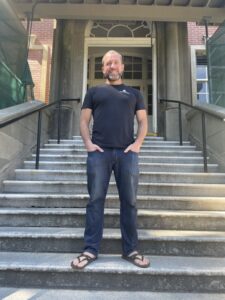During his time at the Fine Furniture/Joinery program at Camosun College, Joel Feinman created a podcast, Pleasure in the Deeds of the Present, where he delves into the history of the class by interviewing his teachers and fellow classmates. Originally a public defender in Arizona, Feinman moved to Canada with his wife and decided to expand on his woodworking hobby.
“I had always been interested in woodworking, I’d always dabbled in it,” says Feinman, who graduated from the program in June. “I’m terrible at it but I’ve always wanted to get better at it. And so we moved to Victoria, and I found this program on the Camosun website. And I figured I’ll never again have, you know, 10 months with no prior commitments, and so I applied and I was lucky enough to get in.”
The teaching style of program leader and instructor Sandra Carr really stood out to Feinman. He says that the attention and dedication she put toward each student was inspiring to him both as a student and a teacher.
“It’s a scholastic experience unlike any I’ve ever either been a student in or taught in,” says Feinman. “I’m also a teacher, I teach now, and I’ve also taught for the last, I don’t know, seven or eight years. This program and the way Sandra teaches it just felt different and it felt special. And I had a suspicion that was confirmed when I started talking to my classmates that the program, while ostensibly about woodworking, did a lot more than just teach people woodworking. It sort of, as cheesy as it sounds… sort of teaches you how to become a better person.”

One of the final class projects was to create a website where students could sell their fine furniture creations. Since woodworking is a hobby to Feinman, he approached Carr with an alternative idea instead.
“I said, ‘What I’d like to do is make a podcast, which I’ve never done, and do an oral history of the class,’” he says. “And so, she, without blinking, said, ‘Okay.’ Even though that wasn’t the assignment, she trusted me. And she let me play into my natural passions and my strengths and create something that I wouldn’t have created otherwise. And I think that’s sort of emblematic of just how great of a teacher she is, and how great of an experience the class was.”
While Feinman doesn’t necessarily consider himself an artist, he enjoyed his time speaking with them on his podcast—which he plans to continue and use as a vessel to propel artists’ stories.
“I’ve always been jealous of artists, and I’ve always loved the idea of being an artist, and I’m not. We have our strengths and weaknesses and the creation of art is not my strength,” he says. “But what this podcast enabled me to do is talk to artists, and hear about their life stories and how they became artists and why they became artists. And I just thought it was really interesting. So, I would actually like to continue.”
Feinman’s time in the program taught him many things but it also surrounded him with a sense of community in the wood shop, which he says was nice, especially being from out of town.
“It taught me a tremendous amount of patience,” he says “It taught me, going back to sort of more Buddhist precepts, it taught me to really appreciate being in the moment, and to focus, and to try and push away distractions. And even if the end result is not exactly what I wanted it to be, which it usually wasn’t, to try and reflect back on how much progress I made, getting to where I am now, considering where I started. And it also allowed me to spend 10 months with just a truly incredible, diverse group of people, and learn from them and really enjoy their company and just enjoy being in the shop. And I can’t understate the aesthetic pleasures of being in a place like Sandra’s wood shop. I mean, the sights, the smells, the sound, the feeling, and sharing those experiences with everybody.”
